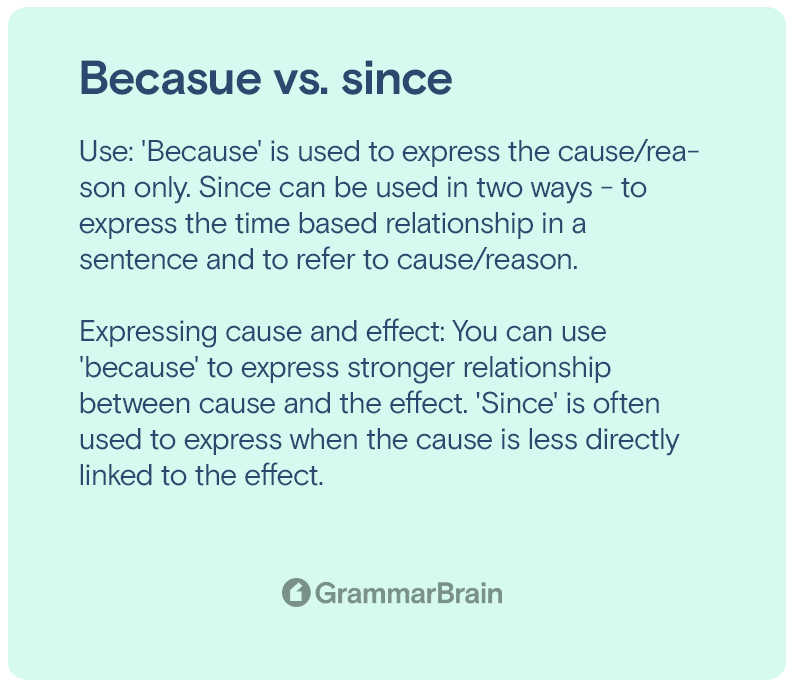‘Because’ and ‘Since’ are classified as casual conjunctions. You can use them to link the “cause and effect” relationship in a sentence. They introduce a reason in the two related clauses of the sentence. Since is also used to refer to a point in time in the past.
Because vs since (meaning)
‘Because’ brings focus on the reason while combining the main clause and the subordinate clause in a sentence. you can use ‘because’ to define the cause of the action/event mentioned in the main clause.
You can use ‘since’ in two ways while combining the main clause to the subordinate clause in a sentence. It is used to refers to time of an event that took place in the past. You can also use ‘since’ to expresses reason/cause similar to ‘because’.
| Word | Definition |
| Because (conjunction) | for the reason that; since. |
| Since (conjunction) | from a time in the past until the time under consideration, typically the present. |
How to use the word “Because”
You can use ‘because’ either in the middle of the sentence or in the beginning of the sentence.
When used in the middle of the sentence, the main clause comes first, followed by the conjunction (because) and the subordinate clause.
Examples are:
- We can not go to the picnic because Richard is not feeling well.
- I am going to the concert because I love country music.
- I have to purchase a new phone because my phone got stolen.
- It is a useful site because it explains everything in points.
You can begin the sentence with ‘because’ to bring extra extra attention on the result. In this case, you must put a comma after the because-clause.
Examples are:
- Because of the flood, there was no power.
- Because of short staff this week, the project is pending completion.
- Because its a Sunday, I am heading to the beach for a game.
- Because I am feeling cold, I am making myself a hot cup of tea.

How to use the word “Since”
You can use ‘since’ to refer a time or to introduce a cause and effect relationship in a sentence.
‘Since’ can be used a as an adverb or a preposition to refer to a previous point in time.
Examples are:
- I have been working as a chef for 15 years, since the age of 28.
- It was our first victory, since April 2021.
- It is more than a week, since I have spoken to her.
- I have known Melinda, since she was in high school.
- It’s been years, since I drove a car.
You can also use ‘since’ as subordinate conjunction similar to ‘because’ . In this case, ‘since’ can express reason/cause for the action or event.
Examples are:
- The school is very particular about the attendance, since it impacts the learning and development of the child.
- Steve walks to work, since his office is very close to his house.
- Martha is not coming to the dance class, since she has found interest in volley ball.
- Greg won’t work at the library, since he is planning to go to college.
Difference between ‘because’ and ‘since’
Use: ‘Because’ is used to express the cause/reason only. Since can be used in two ways – to express the time based relationship in a sentence and to refer to cause/reason.
Expressing cause and effect: You can use ‘because’ to express stronger relationship between cause and the effect. ‘Since’ is often used to express when the cause is less directly linked to the effect.
Examples are:
- I am happy because my project got approved by the senior faculty.
- I like meeting people, since it gives me a new perspective
In the first example, ‘because’ clearly defines the reason for being happy. Use of since in the second example, however, expresses a weaker connection between the two clauses.
Conclusion
‘Because’ is more commonly used to express a reason than ‘since’. Since is used to express time-bound sequential relationships. Use since with caution while describing the cause and effect relationships.
Inside this article
Fact checked:
Content is rigorously reviewed by a team of qualified and experienced fact checkers. Fact checkers review articles for factual accuracy, relevance, and timeliness. Learn more.
Core lessons
Glossary
- Abstract Noun
- Accusative Case
- Anecdote
- Antonym
- Active Sentence
- Adverb
- Adjective
- Allegory
- Alliteration
- Adjective Clause
- Adjective Phrase
- Ampersand
- Anastrophe
- Adverbial Clause
- Appositive Phrase
- Clause
- Compound Adjective
- Complex Sentence
- Compound Words
- Compound Predicate
- Common Noun
- Comparative Adjective
- Comparative and Superlative
- Compound Noun
- Compound Subject
- Compound Sentence
- Copular Verb
- Collective Noun
- Colloquialism
- Conciseness
- Consonance
- Conditional
- Concrete Noun
- Conjunction
- Conjugation
- Conditional Sentence
- Comma Splice
- Correlative Conjunction
- Coordinating Conjunction
- Coordinate Adjective
- Cumulative Adjective
- Dative Case
- Determiner
- Declarative Sentence
- Declarative Statement
- Direct Object Pronoun
- Direct Object
- Diction
- Diphthong
- Dangling Modifier
- Demonstrative Pronoun
- Demonstrative Adjective
- Direct Characterization
- Definite Article
- Doublespeak
- False Dilemma Fallacy
- Future Perfect Progressive
- Future Simple
- Future Perfect Continuous
- Future Perfect
- First Conditional
- Irregular Adjective
- Irregular Verb
- Imperative Sentence
- Indefinite Article
- Intransitive Verb
- Introductory Phrase
- Indefinite Pronoun
- Indirect Characterization
- Interrogative Sentence
- Intensive Pronoun
- Inanimate Object
- Indefinite Tense
- Infinitive Phrase
- Interjection
- Intensifier
- Infinitive
- Indicative Mood
- Participle
- Parallelism
- Prepositional Phrase
- Past Simple Tense
- Past Continuous Tense
- Past Perfect Tense
- Past Progressive Tense
- Present Simple Tense
- Present Perfect Tense
- Personal Pronoun
- Personification
- Persuasive Writing
- Parallel Structure
- Phrasal Verb
- Predicate Adjective
- Predicate Nominative
- Phonetic Language
- Plural Noun
- Punctuation
- Punctuation Marks
- Preposition
- Preposition of Place
- Parts of Speech
- Possessive Adjective
- Possessive Determiner
- Possessive Case
- Possessive Noun
- Proper Adjective
- Proper Noun
- Present Participle
- Prefix
- Predicate



